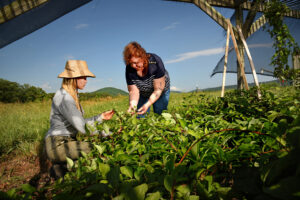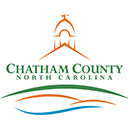INPUT NEEDED: Help Frame the 2023 Chatham County Farmland Preservation Plan
go.ncsu.edu/readext?925772
en Español / em Português
El inglés es el idioma de control de esta página. En la medida en que haya algún conflicto entre la traducción al inglés y la traducción, el inglés prevalece.
Al hacer clic en el enlace de traducción se activa un servicio de traducción gratuito para convertir la página al español. Al igual que con cualquier traducción por Internet, la conversión no es sensible al contexto y puede que no traduzca el texto en su significado original. NC State Extension no garantiza la exactitud del texto traducido. Por favor, tenga en cuenta que algunas aplicaciones y/o servicios pueden no funcionar como se espera cuando se traducen.
Português
Inglês é o idioma de controle desta página. Na medida que haja algum conflito entre o texto original em Inglês e a tradução, o Inglês prevalece.
Ao clicar no link de tradução, um serviço gratuito de tradução será ativado para converter a página para o Português. Como em qualquer tradução pela internet, a conversão não é sensivel ao contexto e pode não ocorrer a tradução para o significado orginal. O serviço de Extensão da Carolina do Norte (NC State Extension) não garante a exatidão do texto traduzido. Por favor, observe que algumas funções ou serviços podem não funcionar como esperado após a tradução.
English
English is the controlling language of this page. To the extent there is any conflict between the English text and the translation, English controls.
Clicking on the translation link activates a free translation service to convert the page to Spanish. As with any Internet translation, the conversion is not context-sensitive and may not translate the text to its original meaning. NC State Extension does not guarantee the accuracy of the translated text. Please note that some applications and/or services may not function as expected when translated.
Collapse ▲ Are you a Chatham County farmer, agribusiness, or simply interested in the future of Chatham County agriculture? Your help is needed to develop the 2023 Chatham County Farmland Preservation Plan! Three surveys have been created to collect data to support this plan. This plan, which is an update to the 2009 Chatham County Farmland Preservation Plan, will contain the current state of agriculture and forestry, outline the challenges and opportunities for agriculture and forestry that exist, and develop recommendations to help maintain family farms and forests in Chatham County.
Are you a Chatham County farmer, agribusiness, or simply interested in the future of Chatham County agriculture? Your help is needed to develop the 2023 Chatham County Farmland Preservation Plan! Three surveys have been created to collect data to support this plan. This plan, which is an update to the 2009 Chatham County Farmland Preservation Plan, will contain the current state of agriculture and forestry, outline the challenges and opportunities for agriculture and forestry that exist, and develop recommendations to help maintain family farms and forests in Chatham County.
Agriculture, forestry, and agribusiness industries account for a significant portion of Chatham County’s total income each year, averaging $125 million in cash receipts and almost $300 million in additional gains from forestry sector output. Agriculture contributes to Chatham County’s beloved green spaces and rural character, provides access to local food, and serves as a foundation for natural resource conservation. With more than 1,100 farms across the county, 98% identify as family farms, and over one-third of the 1,700+ ag producers identify as female. Chatham County figures prominently in the overall composition of agriculture in the region as it currently ranks second in the state for beef cattle production, second for sheep and goat production, third in equine population, ninth in hay production, 15th in dairy cattle population, and 17th in broiler production.
Many challenges face agriculture, such as a heightened awareness of the relationships between farm uses and other land uses, and ever-increasing developmental pressures. In a recent report, North Carolina ranked second in the nation in the potential agricultural land lost by the year 2040. In Chatham County alone, a moderate projection model states the estimated farmland loss in the next 20 years could total nearly 15,000 acres. Farms and forests, when located adjacent to industries and communities, are considered “compatible use partners” and provide numerous benefits to the county and its residents. The Chatham County Farmland Preservation Plan will provide a comprehensive strategy will assist with the county’s agriculture and land use policies and programs as well as develop these compatible partnerships.
The general public, agribusinesses, producers, and landowners are targeted audiences for these surveys. Chatham County Government is funding this project. The Lois G. Britt Agribusiness Center at the University of Mount Olive is directing the project and collecting this anonymous survey data.
You can provide invaluable feedback in one of the following ways:
1. ONLINE SURVEYS: Below are links for farmer/producer-specific surveys, agribusiness surveys, and non-farming/general public surveys.
- Chatham County Farmer/Producer
- If 2023 Chatham County Farmland Preservation Plan strategies are to be meaningful, they need to be shaped by the input of the farm and forest producers. Your responses will help us to understand the needs of agriculture. Please complete this producer survey.
- Chatham County Agribusiness
- Many of Chatham County’s agribusinesses are individual, independent operations with unique interests, needs, and concerns. If the Chatham County Farmland Preservation Plan is to be meaningful, it needs to be shaped by the input of agribusiness owners. If you own or operate a agriculturally-related business in Chatham County, please complete this agribusiness survey.
- Chatham County Resident (Non-Farming/General Public)
- Non-farm resident participation is essential to ensure that views on open space, values placed on farms and forests, and impacts of development are factored into the updated Farmland Preservation Plan. If you are not a farmer/producer, but would like to provide critical input on the future of Chatham County agriculture, please complete this resident survey.
2. HARDCOPY SURVEYS: Need or prefer to provide your feedback on paper? No problem! Printed surveys can be found at the following locations:
- Cooperative Extension/Soil & Water/FSA/NRCS/Forestry offices lobby located at the Chatham County Agriculture & Conference Center (1192 US Hwy 64W Business, Pittsboro, NC 27312). All completed surveys can be returned to this location.
- All three branches of the Chatham County Public Libraries:
- Chatham Community Library (197 NC Hwy 87N, Pittsboro, NC 27312)
- Goldston Public Library (9235 Pittsboro-Goldston Road, Goldston, NC 27252)
- Wren Memorial Library (500 North Second Avenue, Siler City, NC 27344)
The intent of this plan is neither to limit nor restrict landowners’ rights and uses. The plan will increase awareness of agricultural development opportunities and appreciation of agriculture, forestry, and natural resources. The preservation of agriculture is important to the well-being of family farms, as well as to the county and its economy. However, the ultimate decision of agricultural development rests in the hands of the landowners of farms and forests.
Survey data will be collected through May 31, 2023. Responses to the surveys will remain anonymous and are not identifiable. Your participation in this study is strictly voluntary.
For more information, please contact Chatham County Soil & Water Conservation District or N.C. Cooperative Extension – Chatham County Center staff for assistance. Thank you for your interest and participation!
NC State University and N.C. A&T State University commit themselves to positive action to secure equal opportunity and prohibit discrimination and harassment regardless of age, color, disability, family and marital status, genetic information, national origin, political beliefs, race, religion, sexual identity (including pregnancy), and veteran status. NC State, N.C. A&T, U.S. Department of Agriculture, and local governments cooperating. Persons with disabilities and persons with limited English proficiency may request accommodations to participate by contacting Dr. Ginger Cunningham, County Extension Director, at 919.542.8202, ginger_




